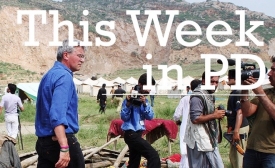global aid and development
Amid the countless meetings, summits and conferences being held around the world to determine the post-2015 development agenda and the future of humanitarian aid, no one is talking much about the growing role of China.
Public diplomacy scholars and practitioners frequently discuss the “say-do gap,” which refers to the discrepancy between discourse and actions. This discrepancy has an adverse effect on the credibility and legitimacy of a nation brand.
Why should politicians care that most Britons think too much tax revenue goes on aid when they can pose as noble saviours of the world? A recent poll by the respected Chatham House think tank found that only 11 per cent of voters want this spending to keep rising, while more than half want it to decrease.
As emergency assistance begins to arrive in cyclone devastated Vanuatu, an international conference on disaster risk reduction considered actions to assist threatened Pacific island nations in warding off future disasters.
Prime Minister Shinzo Abe said Saturday Japan will offer $4 billion in aid for global efforts to improve disaster management over the four years through 2018, including support for building infrastructure in developing countries.
Building local capacity has increasingly become a vital component of humanitarian and development programming. The problem, however, is when different groups have different definitions and expectations of what it should look like in practice — as in the case of Syria.

At the center of this week's public diplomacy news is the strength of the United Kingdom's soft power in today's globalized world.
This commitment is also crucial to our own long-term strategic interests in Britain. In the Department for International Development, we have a unique institution - with the right mandate and funding - which gives the UK world-leading soft power capacity







